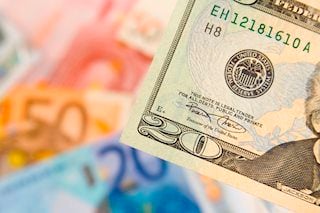EUR/USD strengthens to near 1.1150 ahead of Fed’s Powell speech
|
- EUR/USD gains ground around 1.1140 in Thursday’s Asian session.
- Dovish remarks from Fed officials this week might continue to undermine the USD.
- HSBC analysts expect the ECB to cut rates by 25 bps at every meeting from October through to April next year.
The EUR/USD pair trades firmer near 1.1140 during the Asian trading hours on Thursday, bolstered by the weaker Greenback broadly. Several US Federal Reserve (Fed) officials are set to speak on Thursday, including Fed Chair Jerome Powell. Furthermore, the US weekly Initial Jobless Claims, Durable Goods Orders and final US Gross Domestic Product (GDP) Annualized for the second quarter (Q2) will be released.
Traders await fresh catalysts about how aggressive future US rate reductions would be. Many analysts see the Fed raising jumbo rate cuts again in the November meeting. “Given his comments in Jackson Hole and what we heard from him at the press conference, yes, I think Chair Powell would lean toward cutting 50 basis points again if there were further labor market weakness,” said Mr. Matthew Luzzetti, chief US economist at Deutsche Bank.
Earlier this week, Chicago Fed President Austan Goolsbee said policymakers "can't be behind the curve" if the economy is to have a soft landing. Meanwhile, Atlanta Fed President Raphael Bostic noted the US central bank needn't go on a "mad dash" to lower rates. Fed Governor Adriana Kugler said on Wednesday that she “strongly supported” the central bank’s decision last week, adding that it would be appropriate to cut rates further if inflation continues to ease as expected. Traders will take more cues from Fedspeak on Thursday. Any dovish remarks from Fed officials this week could trigger bets for another oversized interest rate cut by the Fed, which drags the Greenback lower against the Euro (EUR).
Survey data released earlier this week showed Eurozone business activity as a whole contracted sharply, triggering speculation that the European Central Bank (ECB) would cut rates again. HSBC analysts said on Wednesday it now expects the ECB to cut interest rates by 25 basis points (bps) at every meeting from October through to April next year, given weakening economic data.
ECB FAQs
The European Central Bank (ECB) in Frankfurt, Germany, is the reserve bank for the Eurozone. The ECB sets interest rates and manages monetary policy for the region. The ECB primary mandate is to maintain price stability, which means keeping inflation at around 2%. Its primary tool for achieving this is by raising or lowering interest rates. Relatively high interest rates will usually result in a stronger Euro and vice versa. The ECB Governing Council makes monetary policy decisions at meetings held eight times a year. Decisions are made by heads of the Eurozone national banks and six permanent members, including the President of the ECB, Christine Lagarde.
In extreme situations, the European Central Bank can enact a policy tool called Quantitative Easing. QE is the process by which the ECB prints Euros and uses them to buy assets – usually government or corporate bonds – from banks and other financial institutions. QE usually results in a weaker Euro. QE is a last resort when simply lowering interest rates is unlikely to achieve the objective of price stability. The ECB used it during the Great Financial Crisis in 2009-11, in 2015 when inflation remained stubbornly low, as well as during the covid pandemic.
Quantitative tightening (QT) is the reverse of QE. It is undertaken after QE when an economic recovery is underway and inflation starts rising. Whilst in QE the European Central Bank (ECB) purchases government and corporate bonds from financial institutions to provide them with liquidity, in QT the ECB stops buying more bonds, and stops reinvesting the principal maturing on the bonds it already holds. It is usually positive (or bullish) for the Euro.
Information on these pages contains forward-looking statements that involve risks and uncertainties. Markets and instruments profiled on this page are for informational purposes only and should not in any way come across as a recommendation to buy or sell in these assets. You should do your own thorough research before making any investment decisions. FXStreet does not in any way guarantee that this information is free from mistakes, errors, or material misstatements. It also does not guarantee that this information is of a timely nature. Investing in Open Markets involves a great deal of risk, including the loss of all or a portion of your investment, as well as emotional distress. All risks, losses and costs associated with investing, including total loss of principal, are your responsibility. The views and opinions expressed in this article are those of the authors and do not necessarily reflect the official policy or position of FXStreet nor its advertisers.